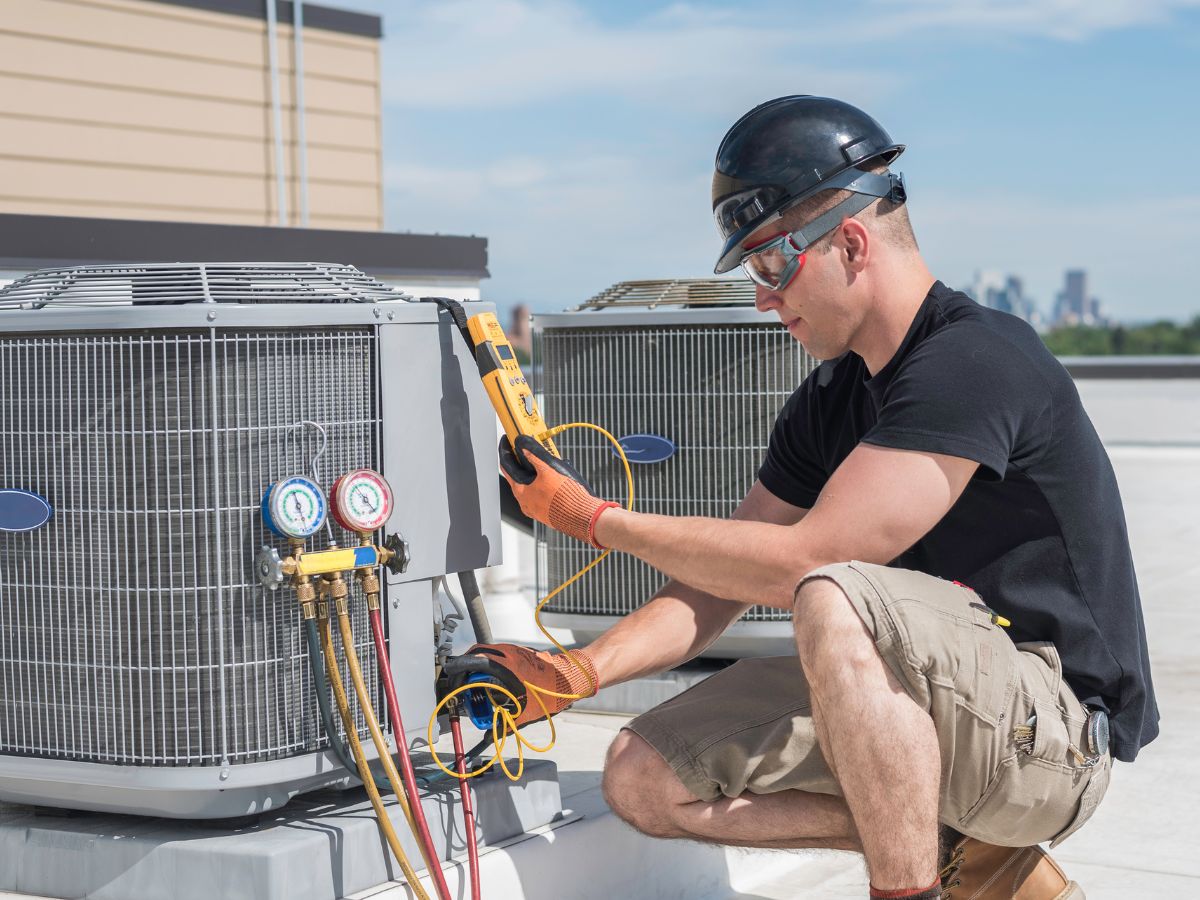
Key Takeaways
- Understand why regular HVAC maintenance is crucial for system longevity and efficiency.
- Learn how to replace air filters and why it’s essential for air quality and system health.
- Discover the importance of duct and vent maintenance and how to keep them clear.
- Find out how to care for critical HVAC components like coils, fans, motors, and bearings.
- Get tips on developing a personalized maintenance schedule that fits your commercial needs.
Unlock Reliable HVAC Performance with Preventive Maintenance
Maintaining your commercial HVAC system isn’t just about comfort; it’s about cost savings, efficiency, and reliability. Regular preventive maintenance can mean the difference between a system that lasts and one that folds under pressure. Think of it as regular health check-ups for your HVAC system to keep it running smoothly.
Why Preventive Maintenance Matters
Most importantly, preventive maintenance helps you avoid unexpected breakdowns, which can be costly and disruptive to your business. By keeping your system in top shape, you’re also ensuring it operates at peak efficiency, which can translate to lower energy bills and a reduced carbon footprint. Besides that, a well-maintained system provides consistent comfort to your building’s occupants.
Costs vs. Benefits: The Real Impact on Your Wallet
When it comes to commercial HVAC systems, the old adage “an ounce of prevention is worth a pound of cure” rings true. Investing in regular maintenance can save you a bundle in the long run. For example, simply replacing a clogged air filter can save you 5% to 15% on your energy bill. Compare that to the cost of a major repair or system replacement, and the benefits are clear.
Filtering Out Trouble: The Essentials on Air Filters
Your HVAC’s air filters are its first line of defense against dust, dirt, and other airborne particles. Keeping them clean is crucial for maintaining air quality and system efficiency. A dirty filter can lead to a host of problems, from reduced airflow to system overheating.
Types of Filters and Their Lifespans
There are several types of air filters available, each with different lifespans and capabilities:
- Fiberglass filters: Last about 1 month
- Pleated filters: Last 3 to 6 months
- HEPA filters: Last up to a year but are typically used in specific industries due to their high efficiency
Step-by-Step Guide to Replacing Your HVAC Filter
- Turn off the HVAC system to avoid any airflow while you’re working.
- Locate the air filter housing, usually found along the return duct or in the air handler.
- Remove the old filter by sliding it out of the housing.
- Check the size indicated on the old filter and purchase a new one that matches.
- Insert the new filter, making sure it faces the correct direction (arrows on the filter’s frame show airflow direction).
- Turn the system back on and mark the date of the filter change for future reference.
Remember, a clean filter not only protects your HVAC system but also contributes to better indoor air quality, which is crucial for the health and well-being of everyone in the building.
Keeping the Airways Clear: Ducts and Vents Maintenance
Clean ducts and vents are vital for the efficiency of your HVAC system. They allow for free airflow, which means your system doesn’t have to work as hard to heat or cool your space. This can lead to energy savings and a longer lifespan for your HVAC equipment.
When it comes to duct and vent maintenance, there are a few things to keep in mind:
- Regularly inspect your vents for blockages or dust buildup and clean them as necessary.
- Keep furniture, curtains, and other items away from vents to ensure proper airflow.
- Consider having your ductwork professionally cleaned every 3 to 5 years, or more frequently if you notice signs of blockages.
Inspection Frequencies for Ductwork
How often should you inspect your ductwork? That depends on several factors, such as the age of your building, the environment around it, and the usage of your HVAC system. As a rule of thumb, a visual inspection annually is a good practice to ensure there are no visible signs of wear or damage.
Signs of Obstructed Ventilation and How to Resolve
If you notice rooms are not heating or cooling evenly, it could be a sign of obstructed ventilation. Other signs include unusual noises from the ductwork or a significant increase in energy bills. If you encounter these issues:
- Check for visible blockages and remove them.
- Make sure vents are open and unobstructed by furniture or drapes.
- If the problem persists, call a professional to inspect and clean your ductwork.
Regular maintenance of your ducts and vents not only ensures the comfort of your space but also the health of your HVAC system and those who use it.
Cleaning Coils and Fans for Optimal Efficiency
Just like a car’s radiator, the coils in your HVAC system are essential for heat exchange. When they’re dirty, they can’t transfer heat efficiently, which means your system has to work harder. That extra effort can lead to higher energy bills and a shorter lifespan for your system. The same goes for your system’s fans; if they’re clogged with dust, they won’t move air as effectively.
To clean your coils and fans, you’ll want to:
- Shut off power to the HVAC system for safety.
- Use a soft brush or cloth to gently remove dust and debris from the coils and fans.
- For a deeper clean, consider using a coil cleaner spray, following the instructions on the label carefully.
- Once clean, turn the power back on and check that the system is running smoothly.
Lubricating Motors and Bearings to Prevent Wear
Friction is the enemy of any moving part. Over time, it can cause wear and tear that leads to breakdowns. That’s why lubricating the motors and bearings in your HVAC system is a key step in maintenance. It keeps everything moving smoothly and extends the life of those parts.
To properly lubricate your HVAC system:
- Identify which parts need lubrication—usually, this will be the motors and bearings.
- Use the right type of lubricant for your system—your manual should specify what’s required.
- Apply the lubricant carefully, making sure not to overdo it, as excess can attract dirt and debris.
The Circuit of Success: Electrical Connection Health
Electrical connections are the nervous system of your HVAC unit. Loose connections can cause malfunctions and even pose a fire hazard. Regular checks can prevent these issues and ensure your system runs without a hitch.
- Inspect all electrical connections to ensure they’re tight and secure.
- Look for any signs of wear or damage to wires and connectors.
- Test the system’s electrical current to ensure it’s operating within safe limits.
Keep in mind, working with electricity can be dangerous. If you’re not comfortable with this step, it’s best to call in a professional.
And remember, if you’re ever in doubt about any part of the maintenance process, it’s always better to consult with a professional rather than risk damaging your system or injuring yourself.
Identifying and Addressing Electrical Anomalies
Electrical issues in your HVAC system often manifest as inconsistent performance or complete system failure. If your system is short cycling, making unusual noises, or not responding to thermostat changes, these could be signs of electrical problems.
Addressing these anomalies usually involves:
- Checking the thermostat for proper operation and battery life.
- Inspecting the circuit breakers and fuses associated with your HVAC system.
- Ensuring all electrical connections are secure and not corroded.
If after these steps the problem persists, it’s time to call a certified HVAC technician. They have the tools and expertise to diagnose and repair electrical issues safely and effectively.
When to Call a Professional vs. DIY Maintenance Tasks
While there are many maintenance tasks you can do on your own, such as replacing filters and cleaning accessible parts, there are times when it’s best to call a professional. Complex tasks like checking refrigerant levels, repairing ductwork, or troubleshooting electrical issues are best left to the experts.
Here’s a quick guide:
- DIY: Replacing filters, cleaning coils and fans, and basic thermostat issues.
- Professional: Refrigerant issues, electrical repairs, ductwork modifications, and anything that involves safety risks.
The Consistency Key: Timing Your Maintenance Right
Consistency is key when it comes to HVAC maintenance. Just like you wouldn’t skip an oil change for your car, you shouldn’t neglect regular check-ups for your HVAC system. Timing these correctly can prevent issues from developing and catch small problems before they become big ones.
Developing Your Personalized Maintenance Schedule
To keep your HVAC system in peak condition, create a maintenance schedule that fits your commercial needs. This could mean monthly filter changes, bi-annual inspections, and professional servicing before the heating and cooling seasons.
Seasonal Considerations for HVAC Upkeep
Different seasons bring different challenges for your HVAC system. Before the summer heat sets in, make sure your system is ready to keep you cool. And before winter arrives, ensure it can keep you warm. Seasonal maintenance typically includes:
- Spring: Checking the coolant levels, testing the air conditioning, and cleaning the outdoor unit.
- Fall: Inspecting the heating elements, testing the furnace, and possibly scheduling a professional tune-up.
The Downfall of Neglect: Consequences of Poor Maintenance
Ignoring HVAC maintenance can lead to a downward spiral of system health. Dust and debris accumulate, parts wear out faster, and efficiency plummets. This not only leads to higher energy costs but also increases the likelihood of a complete system failure.
How Skipped Maintenance Leads to System Failure
A neglected HVAC system has to work harder to maintain the same level of comfort, which puts undue stress on all its components. This can lead to:
- Overheated motors and burned-out capacitors.
- Clogged filters causing reduced airflow and frozen coils.
- Premature wear and tear on belts and bearings.
Regular maintenance is not just about preventing discomfort; it’s about avoiding the cost and inconvenience of major system repairs or replacements.
Partnering with Professionals for Long-Term Reliability
Let’s face it, while there’s a lot you can do on your own, partnering with HVAC professionals offers peace of mind and ensures long-term reliability for your system. They bring expertise, specialized tools, and a keen eye for detail that can help prevent small issues from becoming big headaches. A professional can spot potential problems you might miss and offer solutions that save you time and money in the long run.
So, when in doubt or when faced with complex maintenance tasks, don’t hesitate to reach out to a trusted HVAC service provider. They can offer comprehensive maintenance programs tailored to your system’s needs, ensuring it operates at its best year-round.
Frequently Asked Questions (FAQ)
How Often Should Commercial HVAC Systems Be Serviced?
Commercial HVAC systems should be serviced at least twice a year, typically in the spring and fall, to prepare for the heating and cooling seasons. However, some components, like air filters, may need more frequent attention depending on usage and environmental conditions.
Can I Conduct HVAC Maintenance Myself?
Yes, there are several maintenance tasks you can perform yourself, such as changing air filters and cleaning accessible parts of your system. However, for more complex tasks like refrigerant management or electrical repairs, it’s best to hire a professional.
What Are the Signs That My HVAC System Needs Immediate Attention?
If your HVAC system is making unusual noises, not heating or cooling effectively, emitting strange odors, or causing your energy bills to spike, it’s time to give it immediate attention. These could be signs of a serious problem that requires professional help.
What Is the Average Cost of Commercial HVAC Preventive Maintenance?
The average cost of commercial HVAC preventive maintenance can vary widely depending on the size and complexity of your system, as well as the services included. Generally, you might expect to spend anywhere from a few hundred to several thousand dollars per year on maintenance services.
How Does Preventive Maintenance Impact Energy Bills and Efficiency?
- Preventive maintenance keeps your HVAC system running at peak efficiency, which can significantly reduce energy consumption and lower bills.
- A well-maintained system has a better heat transfer rate, requires less energy to operate, and experiences fewer breakdowns, contributing to overall energy savings.
By adhering to a consistent maintenance schedule and addressing issues promptly, you can ensure that your commercial HVAC system remains a reliable asset to your business. Not only does this approach save you money on energy and repairs, but it also contributes to a comfortable and healthy environment for everyone who uses your space.
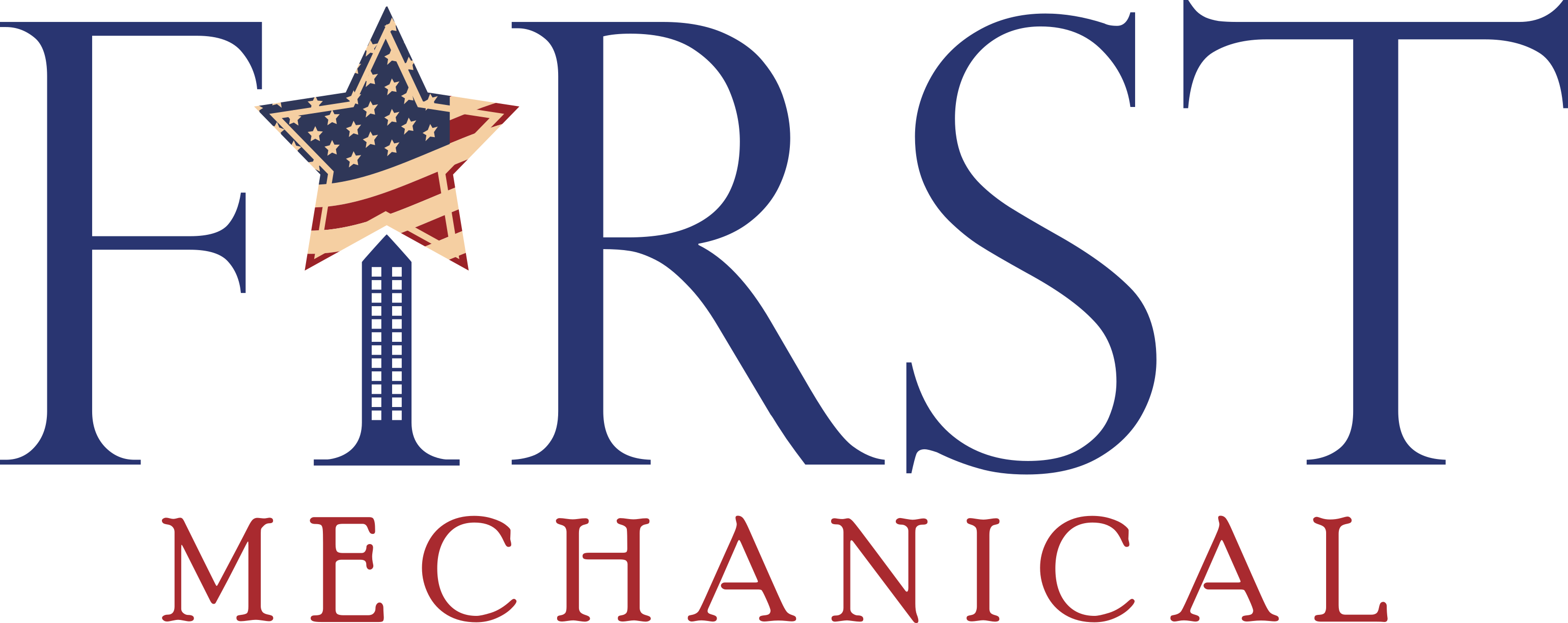





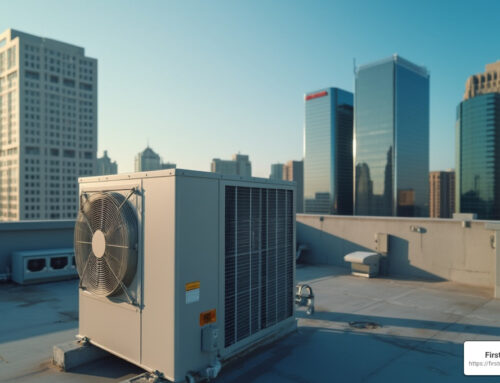
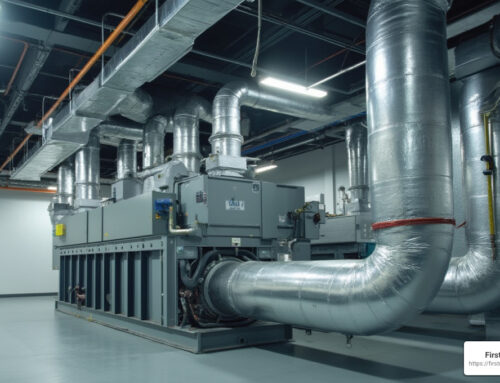
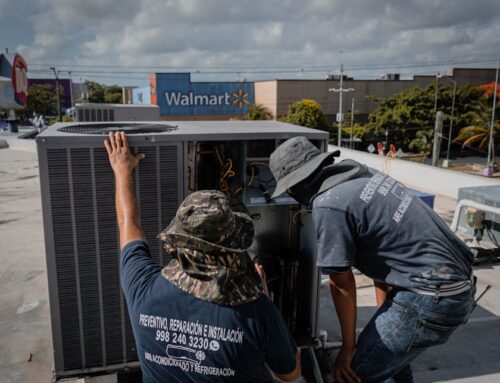
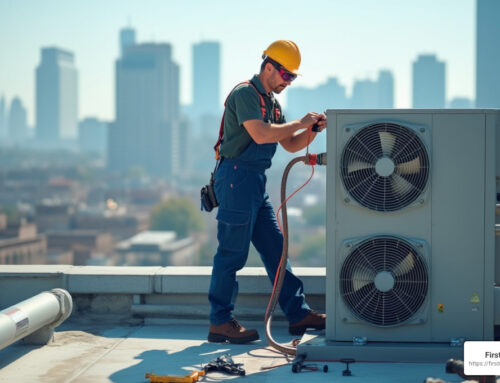


Lorem ipsum dolor sit amet, consectetur adipiscing elit. Mauris nec molestie turpis. Vestibulum sem est, lobortis eu feugiat vitae, ornare at est.